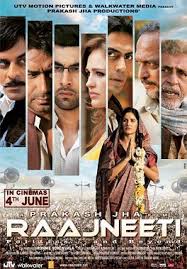Power, betrayal, and ambition take center stage in this political drama that captures the murky underbelly of Indian politics. Rajneeti, directed by Prakash Jha, boasts an ensemble cast led by Ranbir Kapoor, Ajay Devgn, Arjun Rampal, Katrina Kaif, and Nana Patekar, set against the backdrop of modern-day India. The film is a gripping portrayal of political machinations, with its events largely inspired by the Mahabharata, weaving a story of moral ambiguity, intense rivalry, and personal sacrifice. The genre is a heady mix of political thriller and family drama, set in a contemporary timeline, where the stakes are high, and the consequences are even higher.
The story revolves around the Pratap family, which holds significant political clout in India. When a sudden turn of events forces the family into internal conflict, young Samar Pratap (Ranbir) is drawn into the political arena, despite his reluctance. What follows is a fierce battle for power between Samar, his elder cousin Prithviraj (Arjun), and a powerful and manipulative politician, Sooraj (Ajay). The political chessboard is further complicated by the ambitions of Indu (Katrina), a wealthy heiress with political aspirations of her own, and the presence of Brij Gopal (Nana), the family’s trusted advisor. As the family unravels and power struggles intensify, allegiances shift, and the once-cohesive family disintegrates under the weight of their ambitions. With lives at stake, it’s a story that draws sharp parallels to the Mahabharata, where every action has devastating consequences, but the endgame is far from predictable.
One of the most compelling aspects of the film is its stellar cast. Ranbir delivers a nuanced performance as Samar, a young man who is thrust into a world of deceit and ambition, where his intelligence and cold calculation help him survive. His transformation from a naïve academic into a ruthless political strategist is gradual and believable, thanks to his measured performance. Ajay, as Sooraj, brings an intensity to the role of a man betrayed by his lineage, whose hunger for power drives him to the edge. Arjun’s portrayal of Prithviraj, the ambitious heir who cannot bear to see power slip away, is equally commendable. Nana, in the role of the mentor Brij, offers a steady performance, bringing depth and wisdom to the story. Katrina’s character, though somewhat underdeveloped, manages to shine in key moments, especially when her political ambition comes to the forefront.
Jha’s direction is sharp and focused, particularly in how he navigates the film’s complex narrative structure. His ability to balance multiple storylines without losing sight of the central conflict is commendable. The screenplay, co-written by Jha, is tight and engaging, with powerful dialogues that add to the intensity of the political landscape. However, the film could have benefited from more in-depth exploration of some of its characters, particularly the female leads, whose motivations often seem secondary to the men in the story. Despite this, Jha captures the essence of a political thriller, delivering a narrative that is layered and thought-provoking.
Visually, the cinematography by Sachin Krishn adds gravitas to the film. The political rallies, intimate family gatherings, and backdoor dealings are shot with a sense of grandeur, emphasizing the scale of the political battle being fought. The use of lighting and color contrasts the murky ethics of the characters with the vibrant backdrop of Indian political life. The editing by Santosh Mandal is brisk, ensuring the film maintains a tense pace throughout its nearly three-hour runtime, though at times, the complex plotlines can feel slightly overwhelming.
The music, composed by Wayne Sharpe with a few songs by Aadesh Shrivastava, supports the narrative well without overpowering the story. The background score is subtle but effective, enhancing the dramatic tension as the stakes escalate. Songs like “Mora Piya” add an emotional touch to the film, particularly in moments of personal loss and reflection. However, the film’s focus remains firmly on its political narrative, and the music never detracts from that. The sound design is equally strong, with the roar of crowds, gunshots, and whispered conversations adding a layer of realism to the film.
One of the strengths of Rajneeti lies in its thematic depth. The film delves into the age-old conflict between morality and ambition, raising questions about how far individuals are willing to go in their pursuit of power. The family dynamics, deeply rooted in personal ambition and betrayal, mirror the larger political conflicts that unfold. While the Mahabharata influences are clear, Jha modernizes the tale by embedding it in the cutthroat world of Indian politics, where ideals are often compromised for power. Themes of loyalty, betrayal, revenge, and redemption run through the film, giving it a timeless quality that resonates with viewers.
If there is one area where Rajneeti falters, it’s in its handling of female characters. While Katrina’s role grows in importance as the film progresses, other female characters, like Sarah (played by Sarah Thompson), feel underutilized and peripheral to the main narrative. Given the film’s attempt to portray a political epic, a more balanced portrayal of gender dynamics would have added further complexity to the story.
Overall, Rajneeti is a gripping, intense exploration of politics and power, with standout performances and a plot that keeps you on the edge of your seat. Jha’s direction, combined with strong acting and effective technical elements, makes this film a must-watch for fans of political thrillers. While it may occasionally falter in character development, particularly for its female leads, the film succeeds in delivering a story that is both epic and deeply personal. Recommended for anyone interested in a modern-day political drama with historical roots, Rajneeti is an ambitious film that largely hits the mark.







